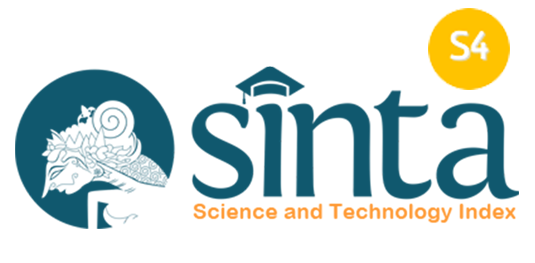Hubungan Self Efficacy (Efikasi Diri) Dan Motivasi Belajar Dengan Prestasi Belajar Siswa Kelas IV SDN Gugus III Kecamatan Labuhan Haji
Penulis
Hidyatul Fatmi , Asrin , Iva NurmawantiDOI:
10.29303/goescienceed.v5i3.382Diterbitkan:
2024-08-28Terbitan:
Vol 5 No 3 (2024): AgustusKata Kunci:
Self efficacy, Motivation, AchievementAbstrak
The low learning achievement of students is caused byself-efficacyand learning motivation, which is one of the psychological factors that influences learning achievement and acts as a motivator to achieve good performance. This research aims to see the relationship between self-efficacy and learning motivation and the learning achievement of class IV students at SDN Cluster III, Labuhan Haji sub-district. The type of research used is correlational research. The population of this research is all class IV students at SDN Gugus II, Labuhan Haji District and the research sample is 60 students. Research data was collected through questionnaires to measure students' self-efficacy and learning motivation and documentation for student achievement. Data analysis techniques use prerequisite tests (linearity test data normality) and hypothesis testingproduct moment correlationat a significance level of 5%. The research results show that 1) There is a positive and significant relationship between self-efficacy and learning achievement, where the value obtained is rcount (3.715) > rtable (0.254) with a sig.(2-tailed) of 0.000 <0.05. 2)The existence of a positive relationship between learning motivation and learning achievement is proven by the value of rcount (4.647)> rtable (0.254) with sig.(2-tailed) of 0.000 <0.05. 3) There is a positive and significant relationship between self-efficacy and learning motivation and learning achievementvalue is obtained sig.(F.change) of 0.000 < 0.05, is at a strong relationship level. The magnitude of the contribution or contribution of self-efficacy and learning motivation to learning achievement was 52.6% with 47.4% influenced by other factors not included in the research.Referensi
Aprillianti, S. W., & Dewi, D. K. (2022). Hubungan antara Self-Efficacy dengan Prestasi Belajar pada siswa di SMA X. Psikologi Teori Dan Terapan, 13(2), 195–213.
Bandura, A. (1977). Self-efficacy: Toward a unifying theory of behavioral change. Advances in Behaviour Research and Therapy, 1(4), 139–161. https://doi.org/https://doi.org/10.1016/0146-6402(78)90002-4
Dimaunahan, J. M., & Panoy, J. F. D. (2021). Academic Motivation and Self-Efficacy in Technical Skills as Correlates to Academic Performance. 2(4). https://doi.org/https://doi.org/10.53378/352077
Fithri, R. (2016). Psikologi Pendidikan. Buku Perkuliahan Psikologi Pendidikan Fakultas Dakwah Dan Ilmu Komunikasi UIN Sunan Ampel Suabaya, 1–164. http://digilib.uinsby.ac.id/20086/1/Psikologi belajar.pdf
Kurniawati, E., & Oktaviyanti, I. (2023). Hubungan Motivasi Belajar dengan Prestasi Belajar IPS Pada Siswa Kelas IV SDN Gugus 3 Kecamatan Langgudu. Jurnal Ilmiah Profesi Pendidikan, 8, 475–481. https://doi.org/https://doi.org/10.29303/jipp.v8i1b.1183
Lianto, L. (2019). Self-Efficacy: A Brief Literature Review. Jurnal Manajemen Motivasi, 15(2), 55. https://doi.org/http://doi.org/10.29406/jmm.v15i2.1409
Lingis, S. … Laksana, D. N. L. (2021). Hubungan antara Motivasi Belajar Dengan Hasil Belajar Siswa Kelas lV SD Pada Tema Daerah Tempat Tinggalku DI Gugus V Kecamatan Golewa Kabupaten Ngada Tahun Ajaran 2029/2020. Jurnal Citra Pendidikan, 1, 26–35.
Maulani, F. I. … Zanthy, L. S. (2020). Konstribusi self efficacy terhadap prestasi belajar matematika pada siswa sma. 7(1), 45–49.
Monika, & Adman. (2017). Peran efikasi diri dan motivasi belajar dalam meningkatkan hasil belajar siswa sekolah menengah kejuruan. 2(2), 219–226.
Ningrum, P., & Rahmawati, R. D. (2022). Pengaruh Self Efficacy Terhadap Prestasi Belajar. Ilmiah Kependidikan, 3(1), 41–47. https://doi.org/https://doi.org/10.37478/jpm.v3i1.1394
Putu, N. … Japa, I. G. N. (2020). Pengembangan Instrumen Penilaian untuk Mengukur Motivasi Belajar Siswa SD. Ilmiah Pendidikan Profesi Guru, 3, 249–257. https://doi.org/http://doi.org/10.23887/jippg.v3i2
Radjiman, I., & Sahidun, N. (2019). Peningkatan Kecerdasan Intrapersonal Dan Interpersonal Melalui Metode Bermain Peran Di Kelompok B Paud Titian Kasih.
Rohman … Widianti. (2012). Metode One-Stage dan Two-Stagecluster Sampling.
Rukayah … Rachman, S. A. (2022). Hubungan Pergaulan Teman Sebaya dengan Prestasi Belajar Siswa Kelas IV SD Gugus IV. Pendidikan & Pembelajaran Sekolah Dasar, 2(1), 19–27. https://ojs.unm.ac.id/jppsd/index%0AHubungan
Salsabila, A., & Puspitasari. (2020). Faktor-Faktor yang Mempengaruhi Prestasi Belajar. Pandawa : Jurnal Pendidikan Dan Dakwah, 2(2), 278–288.
Saputri, R. M. … Ilhamdi, M. L. (2022). Hubungan Kreativitas Mengajar Guru dengan Motivasi dan Hasil Belajar IPA Siswa Kelas IV Gugus V Mataram Tahun Ajaran 2020 / 2021. Ilmiah Profesi Pendidikan, 7(1), 197–203. https://doi.org/https://doi.org/10.29303/jipp.v7i1.435
Sardiman. (2016). Interaksi & Motivasi Belajar Mengajar (p. 85). PT RajaGrafindo Persada, Jakarta.
Syam, P. D. R. … Raihan, S. (2021). Hubungan Self-Efficacy Terhadap Prestasi Belajar Siswa Kelas III Pada Pembelajaran Hybrid Learning Di Sekolah Dasar. Pinisi Journal Of Education, 1–13.
Taufik, T., & Komar, N. (2022). Hubungan Self Efficacy Terhadap Peningkatan Motivasi Belajar Dan Hasil Belajar Matematika Siswa Di Sekolah. Andragogi: Jurnal Pendidikan Islam Dan Manajemen Pendidikan Islam, 3(2), 183–200. https://doi.org/https://doi.org/10.36671/andragogi.v3i2.220
Lisensi
Hak Cipta (c) 2024 Jurnal Pendidikan, Sains, Geologi, dan Geofisika (GeoScienceEd Journal)

Artikel ini berlisensiCreative Commons Attribution-ShareAlike 4.0 International License.












